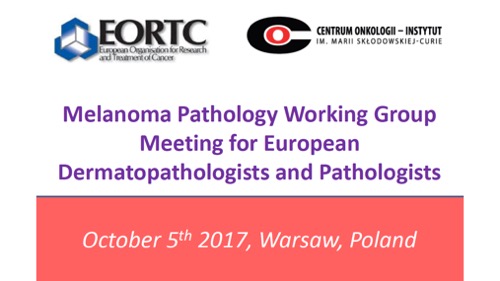warsztaty o czerniaku w Warszawie
Szanowne Koleżanki i Szanowni Koledzy,
Zapraszamy na „Melanoma Pathology Working Group Meeting for European Dermatopathologists and Pathologists„ organizowanego przez EORTC przy współpracy z Oddziałem Warszawskim PTP.
REJESTRACJA DO 2 WRZEŚNIA!!!
Moderatorzy warsztatów:
| Martin Cook, M.D. | Daniela Massi, M.D. |
| CRUK Institute, Manchester | Department of Pathology |
| Royal Surrey County Hospital | University of Florence |
| Guilford, UK | Florence, Italy |
Data i miejsce:
5 października 2017
Centrum Onkologii – Instytut im. Marii Skłodowskiej-Curie
Centrum Edukacyjno-Konferencyjne im. Prof. Tadeusza Koszarowskiego
wejście G przy ul. Wilhelma Konrada Roentgena 5; 02-781 Warszawa
Udział w warsztatach jest BEZPŁATNY dla Członków PTP!!!
Prosimy o rejestrację zgodnie z informacjami zamieszczonymi w poniższym zaproszeniu:
Melanoma Pathology Working Group Meeting
for European Dermatopathologists and Pathologists
Warsaw, Poland
October 5th, 2017
Local Host: Prof. Dr. Monika Prochorec-Sobieszek
Department of Pathology and Laboratory Medicine
Maria Sklodowska-Curie Memorial
Cancer Center and Institute of Oncology
Course Moderators:
| Martin Cook, M.D. | Daniela Massi, M.D. |
| CRUK Institute, Manchester | Department of Pathology |
| Royal Surrey County Hospital | University of Florence |
| Guilford, UK | Florence, Italy |
Course Location:
Maria Sklodowska-Curie Memorial Cancer Center and Institute of Oncology,
Educational and Conference Center, Entrance G, 5 Roentgena Str., 02-781 Warsaw, Poland
No Fee to Attend.
European CME credits by the EACCME (European Accreditation Council for Continuing Medical Education) will be requested.
If you wish to attend, please register (before September 2th 2017) through our website: www.melanomagroup.eu
In case of questions, please e-mail to: radoslaw.nazar@viamedica.pl
Scientific Programme
Teaching Course
Pathology of challenging melanocytic proliferations from consultations files
The diagnosis and classification of melanoma and ambiguous melanocytic proliferations is notoriously difficult even to the experienced pathologist. This is largely due to the wide morphological spectrum of these neoplasms often showing only subtle differentiating features. This practical course aims to provide an overview of the important aspects of melanoma pathology with emphasis on recently published findings and molecular genetics developments. There will be a particular focus on diagnostic pitfalls, morphological clues to the correct diagnosis, appropriate use and interpretation of immunohistochemistry and clinical relevance. This course is suitable for a wide audience and may be particularly beneficial to dermatopathologists in practice.
The course will be presented in a case-based format. Pre-registrants will be able to view virtual slides prior to the meeting.
10.00-10.15 Case 1 Willeke Blokx
10.15-10.30 Case 2 Willeke Blokx
10.30-10.45 Case 3 Anna Szumera-Ciećkiewicz
10.45-11.00 Case 4 Daniela Mihic-Probst
11.00-11.15 Case 5 Anna Nasierowska-Guttmejer
11.15-11.30 Case 6 Joost van den Oord
11.30-11.45 Case 7 Joanna Czuwara
11.45-12.00 Case 8 Senada Koljenovic
12.00-12.15 Case 9 Martin Cook
12.15-12.30 Case 10 Martin Cook
12.30-13.00 Discussion
Faculty
Wille Blokx, Njimegen, The Netherlands
Martin Cook, Guildford & Manchester, UK
Joanna Czuwara, Warsaw, Poland
Senada Koljenovic, Rotterdam, The Netherlands
Daniela Massi, Florence, Italy
Daniela Mihic-Probst, Zurich, Switzerland
Anna Nasierowska-Guttmejer, Warsaw, Poland
Anna Szumera-Ciećkiewicz, Warsaw, Poland
Joost van den Oord, Leuven, Belgium
Welcome Message from the EORTC Melanoma Pathology Group
The EORTC Melanoma Pathology Group has the primary goal of promoting collaborative and interdisciplinary activities, research and education in the field of melanoma pathology. In addition, the role of pathologists inside the EORTC Melanoma Group is to support clinical trials and their research aspects by offering quality control as well as to collaborate to scientific projects that have relevance to the overall understanding of melanocyte pathobiology.
The Group represents a friendly and informal environment, favouring communication and an unrestrained exchange of scientific information beyond state boundaries.
Starting from 2015, it has been agreed that in association with the annual EORTC Melanoma Group meetings http://www.melanomagroup.eu/site/ there will be a special session with teaching courses for pathologists focused on different topics ranging from problematic diagnostic areas in melanoma to molecular characterization and novel tissue biomarkers discovery in the era of the novel melanoma therapies.
It is critical that we all participate actively in these activities to develop a system that is beneficial to our patients and applicable to our practicing physicians, enhanced by our experience and direction.
Prof. Martin Cook Prof. Daniela Massi

